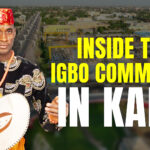There is something about that whole Y2K fever from 25 years ago that seemed timeless. It was a soundbite I thought would echo into perpetuity – or at least rear its head every once in a while, forever. Y2K was not only a soundtrack for the New Millennium, it was also Year Zero of Nigeria’s fourth and longest experiment with republican democracy anchored on federal principles.
The Nigeria I lived in back then galloped into the New Millennium with profound poise. It was just a matter of time – with political power finding its way back where it should be, life would be breathed back into the Nigerian project and the sky will be the limit. Civilian rule was an overriding objective even if under a perfunctory, stopgap constitution slapped together by the elite establishment hastily so they can go home.
Down the road, there came the demand to look into the relationship between the disparate and mutually antagonistic segments of the Nigerian polity with the Nigerian state. For all the grandstanding about unity and sincerity of purpose, especially in the pan-African contexts, the demands of realpolitik meant that further questions would be asked especially with respect to the binding social contract between leaders and their people.
About six years into Nigeria’s independence, the corruption and intrigue precipitated a bloody coup that claimed the lives of the leading politicians in the North and the West. The coup itself was led by Igbo officers from the East, and by whatever happenstance, Igbo leaders were spared by the assassin’s bullets.
The latter-day clamour for “true federalism” gathered steam mostly from the activities of Western political interest groups after the regime of President Obasanjo failed to deliver promises made by the midwives of the Fourth Republic. Meanwhile, the war over resource control and/or fiscal federalism has raged for decades at different levels of intensities depending on the regime and who is heading it.
What is interesting is that, it was actually a government headed by a Southerner that herded the Nigerian nation on the track that brought it into the unitarian doldrums the South is protesting today. The North was vehemently against unitarism back then, but for obvious reasons, it is its biggest defender today. The entrenchment of fiscal federalism will leave it out in the cold after being used to a certain standard of luxury.
It is now 63 years after the independence of the Nigerian federal state. So, what are the challenges? What are the triumphs?
A full 11 decades after the amalgamation of the northern and southern protectorates, there are still strong and persistent agitations by interest groups in the polity demanding the restructuring of the existing political arrangement. Some argue that this is the only solution if the country must remain an indivisible and indissoluble entity as the 1999 Constitution says. These agitations come on the heels complaints that Nigerian federalism has assumed the unmistakable attributes of a unitary system of government. Most observers agree with the above line of thought, describing Nigeria’s federal experience as “proxy unitary” in character. This is because Nigeria is a federalist state on paper but unitary by proxy.
A friend of mine believes that federalism is a conundrum Nigeria cannot live with or without. It was pseudo-federalism that has sustained Nigeria’s existence as a single corporate entity. It is also the ineffectual streak of pseudo-federalism that has stifled the individual potentials of the various segments of Nigerian society. Without the strength and decisiveness of federal might, there will almost certainly not be a Nigeria today.
Now, this isn’t necessarily a good thing even though it is a good thing from my perspective as a Northern Nigerian. As is clear, the North has a vested interest in maintaining the Nigerian nation and the pseudo-federal arrangement guiding state administration. The North will be mostly insolvent without the monthly handouts from the federation account–the so called “feeding bottle federalism”. This is a system that has ensured the wider distribution of public resources through revenue sharing and other forms of fiscal arrangements that guarantee an agreed share of resources to all parts of the country, and this guarantees a truly shared future.
Twenty-five years after, it is fair to begin the evaluation of Nigeria’s federal dynamic under the Fourth Republic. The problem is that successful federalism requires all of its benefits: well-functioning democratic institutions, an effective judicial system, integrated national political parties and appropriate electoral incentives created by democratic political competition.
The basic idea here is that only in well-functioning democracies can federalism be a stable and effective form of government. And conversely, outside of the democratic context, federalism is ultimately an unstable form, which logically progresses either to territorial disintegration or to becoming a mere constitutional formality. I want to be fair to those advocating for “true federalism” through restructuring but one fatal flaw in their line of reasoning is the tendency for placing the cart before the horse. You have to have a foundation upon which the federal character we wish to see can rest.
Advocates of federalism forget to mention that government functions have been duplicated via the devolution of powers, leading to the delivery of overlapping or contradictory policies at different levels of government. Although the 1999 Constitution has made attempts to specify which level of government has primacy in each policy domain, many policies cut across these functional boundaries or can affect other policies in unpredictable and undesirable ways. As a consequence, the responsibility of the different levels of government for policy outcomes and service delivery may have been hindered by the actions or inactions of other levels of government.
While federalism has provided opportunities for autonomy and recognition for ethno-cultural minorities in Nigeria, it can also expose minorities within constituent units to discrimination and oppression, particularly in states established on ethnic, linguistic, cultural or religious lines but contain within them minorities belonging to different groups. This is the story of most states in the country. A strong central government, on the other hand, may protect such locally concentrated minorities and ensure the equal protection of the law.
One scenario I can call from personal experience to symbolize this particular problem of federalism is the Zuru backwaters, in my native Kebbi State. This part of the state is a tragic tale of discrimination against the ethno-religious minorities populating that part of the state. In Zuru, it is common to go more than a whole year without electricity and the roads are at best atrocious. A while back, the state’s politicians vetoed a proposal to appoint a minister from Zuru to represent Kebbi at the Federal Executive Council. Reasons? Zuru and environs are mostly non-Hausa/Fulani. A significant part of the population isn’t Muslim too.
Powerful interests within Nigerian states have misused subnational governments for private gain at the expense of the common good. Corruption, always difficult to eradicate, is especially hard to tackle at the state where it may be embedded in local networks and take place far from the eyes of national anti-corruption authorities.
In situations where many voters are economically or socially dependent on local elites and instead of a decentralised democracy, most Nigerian states have become decentralised oligarchies or plutocracies. In Nigeria, state governors are basically imperial warlords, thanks to the federal guarantee for state autonomy.
Notwithstanding all the challenges, this federal journey is more successful than it is a failure. One of its hypothetical triumphs is the provision of a framework for the recognition of ethnic, religious, linguistic or other cultural communities, reflecting their desire to be recognized as a people with a distinct identity and particular interests. This is however a dividend that cannot be associated with the Fourth Republic since no additional ethno-states have been created.
As it stands, Nigeria’s federalism has only further alienated minorities without a state of their very own. Hypothetically speaking, by guaranteeing some autonomy to minorities, Nigeria’s federal establishment has allowed them to exercise partial self-government through state and local government institutions while still sharing certain functions with other communities through federal or national institutions. By satisfying demands for autonomy and recognition, Nigeria’s federal constitution protects minorities, prevent conflict, increase the legitimacy of democratic institutions and reduce pressure for secession; but by lumping them together in the same state with more powerful ethno-religious groups, it has further emasculated them.
Federalism has supported political groups that are minorities on the federal or national level to hold office at the state and local levels. This has had a beneficial effect in promoting political inclusion and a balance of power such that an Ijaw minority can become a head of the Nigerian state.
By allowing sub-national units to develop their own policies to meet their own needs, federalism has promoted innovation and experimentation in policymaking, enabling states to pioneer innovative policies that would not be politically viable at the national level.
For some reason, the Y2K soundtrack plays in my mind every time I am in Lagos. Lagos happens to be the poster child for the good federalism has to offer. Kebbi might actually be on the other extreme.

 Join Daily Trust WhatsApp Community For Quick Access To News and Happenings Around You.
Join Daily Trust WhatsApp Community For Quick Access To News and Happenings Around You.



